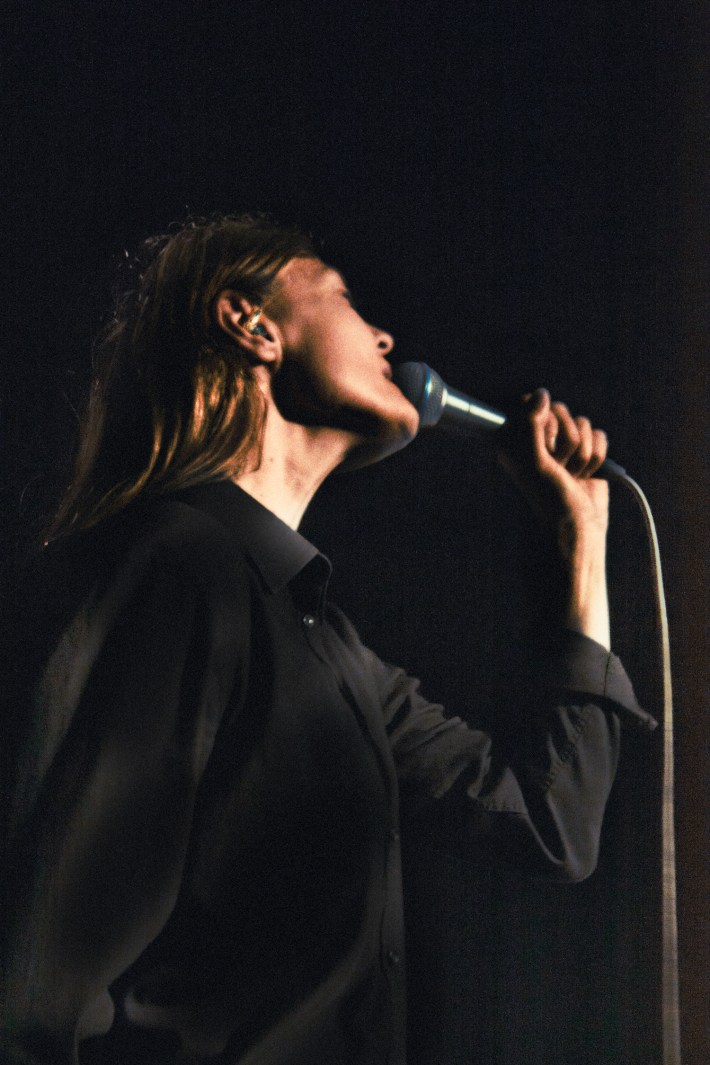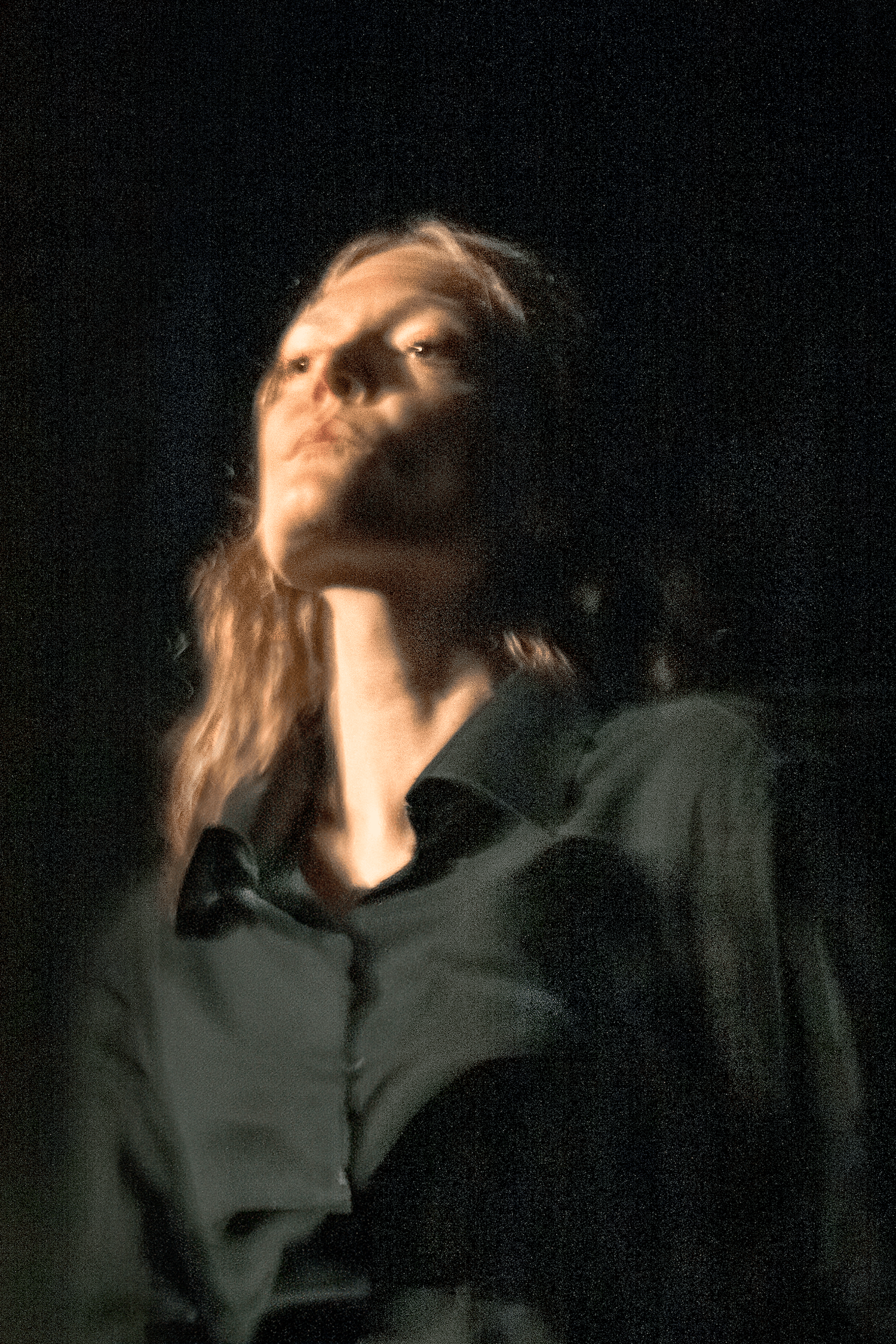Every artist has a set of recurring tropes, and for ML Buch it’s a few very specific images: a body falling apart then coming back together again; light bouncing from a reflective surface (particularly glints of sun on the sea). They are regular fixtures across her work, and possibly always will be. "It's nice to have these eternally, some elements or props or fragments that keep being relevant to me," she told me recently at a Cuban café in Los Angeles, though she has "no interest in understanding" why she keeps gravitating towards them. It’s been 10 months since she released Suntub, her masterpiece, and she has no interest in understanding that either. "I was singing about the 'film of sky’, whatever that is," she said.
Suntub is really too monumental for articulation or understanding. As we gain more distance from it, I become increasingly certain that Suntub will be looked upon as one of the great works of the mid-2020s. It’s a suite of cyberpastoral music that ticks to its own metronome, wraps us up in a sense of deep time, and takes us out of the timescale of daily life. Few albums in recent memory have given its listeners vistas so immense, or allowed us to experience an entire universe as directly as a single second. Walking with it, headphones in, you actually feel your senses re-tuning and enlarging. Ever since I first listened to Suntub, the natural world has seemed different. I can no longer look at roadkill or swarms of mosquitoes or the sun on the sea the same way.
While its reception was relatively quiet upon its release in September of last year, Suntub gradually became something of a phenomenon among Discog and Boomkat crowds, who quickly sold out the vinyl when Buch released it to order in March. It received all the accolades I’m supposed to point out here: numerous mentions on year-end lists, a laudatory Pitchfork review that at least read like a Best New Music. Suntub also allowed Buch to not only tour the States for the first time, but to sell out shows across both coasts as well as Canada. At a time when mid-tier acts are struggling to even tour nationally, it’s heartening to see a somewhat niche artist from Copenhagen drawing audiences so easily — and audiences not only on their best behavior but entirely rapt, silent.
I was due to meet Buch for lunch in Los Angeles two hours before her final soundcheck of the tour. She’s a cool and withdrawn presence online, clearly disinterested in revealing anything about herself beyond her music; I had no idea what to expect. She arrived at 1PM sharp, wearing an oversized painter’s shirt and loose-fitting, inconspicuously beautiful black slacks. There was an air of winsomeness about her, a rascally tomboyishness. When she moved, she sprang; the bag full of clothes she carried darted and swang alongside her. She introduced herself as "ML," hugging me while maintaining a personable distance, like a boss who signs a birthday card with their signature and a smiley face.
This was Buch’s first time in LA. While everyone else tuned out the sound of the homeless person on the street, Buch listened distractedly, her eyes bulging. They narrowed as a Tesla Cybertruck drove by. She shook her head in its direction, and simply said "no," then went back to eating her Cubano sandwich with a knife and fork.
Buch was half exhilarated, half exhausted from playing eight shows in almost as many days and cities. "I'm somewhat introverted, so it's quite extreme but it's also really nice," she said, "now I have to get home to my Copenhagen suburb and walk my dog and write more music." A smile spread on her face, curling shyly in the corners of her mouth. That smile appeared several times when she performed later that night. There was no coolly affected distance, absolutely zero difference between the person I had lunch with and the person who performed to a sold out crowd. She smiled every time the audience applauded and whenever there was a certain sound in a song she seemed to like.
Buch was similarly gracious when she met fans outside her shows. She listened appreciatively while they told her about their time with Suntub. So many of us, it seems, experienced the album in a curiously similar fashion. "People say that they are moving their bodies to it and that it’s been great for them," she reported. "They say something about the isolation as well, but not in a heavy way."
I imagine it’s rare for a record’s reception and output to match its input so neatly. Buch wrote Suntub in isolation and on the move, recording in her car and mixing a whole hour’s worth of music just using her headphones. "It seems banal, but it also didn’t make sense to sit in a dark studio space. I needed to get out and experience stuff. I hope that translates," she said. She also needed to get out of the city: "There’s a lot of noise there and I just needed to find my voice." The Copenhagen scene — which includes Erika de Casier, Astrid Sonne, and Clarissa Connelly; three artists who have made some of this year’s finest music — is both tight-knit and malleable. "I like to weave in and out, and it always allows for that," she said, "I don’t think I’m in a community where I’m just a brick in the wall."
She moved to Kalundborg, a small city on one of Denmark’s largest islands, and recorded between the ocean — which she described as a "portal into an imaginative world" — and a countryside full of "dead animals and rotting and dissolving plants and organisms." Both worlds collide on the album, forming a kind of sublime body horror. "Pan Over The Hill," one of the most beautiful songs I’ve ever heard, is also lyrically one of the most gruesome; Buch sings of a body blown apart, flesh flapping in the sky like a kite, detached skin warmed by the sunshine. "It was nice finding peace with the fact that that’s all a part of nature. It’s just nature and it’s brutal," she said, (a sentence I thought about while she performed later that night in a sparkling skeleton suit).
"I chose ‘Pan Over The Hill’ to be the opening because there’s a tilt, there are some camera movements in there of the wind and the sun," she said. Buch tended to use the language of filmmaking when she spoke about her creative process. I asked whether she saw herself as a director. "Maybe I do, actually. It’s fun to see the framings and the light but in a very abstract way. I know music is very time-based but it’s fun to treat it as though it isn’t, like it is a composite of some sort."
Buch is a master craftsman of spacetime. Take "Flame Shards Goo," a song that sounds like Joni Mitchell’s "Amelia" fed through a 3D printer. It’s a marvel that she’s able to produce and sustain such intricate structures on Suntub while inventing a language all her own. She began work on the album over five years ago, knowing immediately that it would be a "guitar record," though she says she’s not a guitarist: "I have no idea what I’m doing. Notes, chords — it’s not that important to me." The chords that are on the album sound largely self-invented, a product of Buch’s own internal notation. One of her main objectives for the guitar was to make it sound as though "the sun’s hitting it," she said. "That stubbornness may seem really silly to other people, but you just have to go with those ideas and then see what comes out. I don’t have a need to understand why. Like, I don't need to analyze things. I want to ask questions, not answer them."
That Suntub exists at all is a sort of wonder; it’s an astonishing act of stubbornness and patience. Working in isolation and under her own direction for so long presented plenty of opportunity for doubt. "It’s hard to be confident about what you’re doing when you’re doing it all by yourself, but that was the right way to do it and I just felt like I needed to do it." That she was simply able to finish Suntub is her proudest achievement. "It’s given me confidence to trust my instincts. To just go for it."
Now, she’s attempting to balance that confidence with "playfulness, awkwardness; the human errors that inevitably snake up when you’re in transition" — meeting teenage feelings with adult contemplation. "Maybe when you’re making an album, the songs are getting in touch with some Earthly dreams of life, early aspirations," she said, "and then it's just really nice to be an adult as well and just make the decision to go do your own thing." Currently, her 'thing' is learning notation and writing to strings for the first time."I feel like the world is open, like it’s increasingly important to take chances, I can just try things out."
Of the music she’s currently working on, she says she’s "seeing different fragments". She’s returning to her favorite image — "the sun hitting the sea, when it looks like a road towards the sky" — from a different angle. "I think I’m going to bring that into the next project as well, the bouncing and the splintering light," she said, content to look at that glow for a lifetime.







